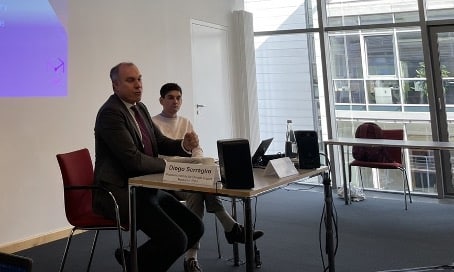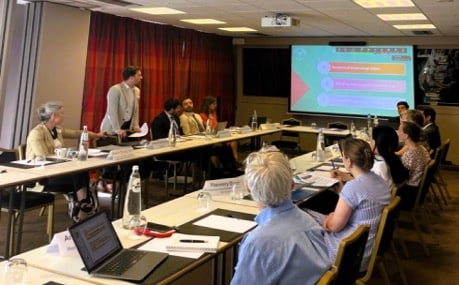In June, the HABITABLE project hosted two stakeholder workshops, which looked at the interplay between human mobility and climate change. These workshops centered on the concept of habitability, bringing together experts and policymakers to share insights, discuss current and future challenges, and develop actionable policy recommendations. The HABITABLE project has been at the forefront of research on this critical issue, conducting extensive fieldwork across seven African and Asian countries: Ethiopia, Ghana, Kenya, Mali, Senegal, South Africa, and Thailand. Employing diverse methodologies, the results support and provide further nuance to the finding that environmental and climate hazards often act as indirect catalysts, exacerbating pre-existing vulnerabilities that, in turn, drive migration decisions.

Understanding the role of perceptions in migration decisions
Migration decisions are inherently complex, influenced by a combination of sudden and slow-onset climate events. The Potsdam Institute for Climate Impact Research (PIK) conducted more than 600 semi-structured interviews in the project’s research countries. Their results underscore that it is a household’s prior socioeconomic conditions and the broader sociocultural context that largely determine whether migration serves as an effective adaptive strategy, or is maladaptive and increases vulnerability further. Gender also plays a significant role and affects perceptions and responses to climate shocks and migration decisions.
Repeated environmental and climate shocks, coupled with non-environmental factors, can lead to a deterioration in household conditions, resulting in economic and non-economic losses and damages, and potentially prompting a decision to migrate. Financial remittances sent by migrants can mitigate economic losses, thus representing a key benefit of migratory flows. However, migration itself can be seen as a non-economic loss, contributing to further non-economic losses and damages, such as the erosion of social networks and community traditions. Therefore, human mobility, recognized by the UNFCCC as a form of non-economic loss and damage (NELD), is both a consequence and a form of loss and damage.

The workshops also provided an opportunity to present the aspirational and crisis scenario narratives that were co-created by adelphi with the HABITABLE in-country teams and other country and regional experts. The video series based on these scenarios can be found here.
The scenarios highlight both economic and non-economic losses and damages due to climate change impacts, and identify policy entry points to ensure a habitable future, including strengthening sustainable rural and urban development, climate resilience and adaptation, social protections, and access to resources and finance.
Given that HABITABLE’s research aims to change narratives and add nuance to the understanding of human mobility as NELD, a significant point of discussions was the Loss and Damage Fund (LDF), established at COP28. Key questions were raised about the fund’s operationalization and how it can effectively reach affected communities. Enhanced Nationally Determined Contributions (NDCs) and National Adaptation Plans (NAPs) also remain key opportunity areas for providing structured responses to climate-related human mobility.
A step towards implementation and funding
While there have been significantly advances in our knowledge of how climate is impacting migration and displacement in recent years, further efforts are still needed to address the practical challenges of providing finance and support to the people most affected by climate change. The workshop held in Brussels highlighted the importance of moving beyond theoretical discussions to actionable solutions. Research, like that undertaken in the HABITABLE project, provides a detailed understanding of local needs, ensuring that interventions can be tailored to the specific contexts of affected communities. By bridging the gap between knowledge and action, stakeholders can successfully aim to develop and implement policies that effectively address climate impacts on the ground.

Beyond knowledge sharing: Key takeaways for policymakers
- Pursue multilateral initiatives and a whole-of-government approach to ensure horizontal and vertical policy coherence required to strengthen habitability, sustainable development, and responses to migration in the context of climate change.
- Continue to develop methods for modeling responses to environmental shocks that go beyond a deterministic focus on objective climate parameters and also factor in the influence of pre-existing capabilities and vulnerabilities, and individual and collective perceptions of emerging changes and risks.
- Develop inclusive approaches that meaningfully incorporate local perspectives into policymaking, programming and projects linked to climate-related migration.
- Create an enabling environment for migration to serve as a potential adaptation strategy, as part of a human rights-based approach (HRBA) that enhances choice and safety for people living in climate-vulnerable countries.
- Support trans-local approaches that improve conditions holistically across origin, transit, and destination areas.
Authors: Emily Wright O’Kelly, Tobias Bernstein, Rachele Semeghini (adelphi)v Pursue multilateral initiatives and a
whole-of-government approach to ensure horizontal and vertical policy coherence
required to strengthen habitability, sustainable development, and responses to
migration in the context of climate change.v Continue to develop methods for modeling responses to
environmental shocks that go beyond a deterministic focus on objective climate
parameters and also factor in the influence of pre-existing capabilities and
vulnerabilities, and individual and collective perceptions of emerging changes
and risks. v Develop inclusive approaches that meaningfully incorporate
local perspectives into policymaking, programming and projects linked to
climate-related migration. v Create an enabling environment for migration to serve
as a potential adaptation strategy, as part of a human rights-based approach
(HRBA) that enhances choice and safety for people living in climate-vulnerable
countries.v Support trans-local approaches that improve conditions
holistically across origin, transit, and destination areas.
